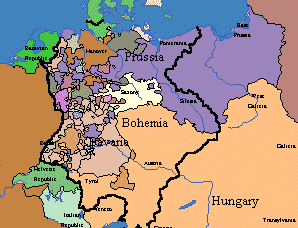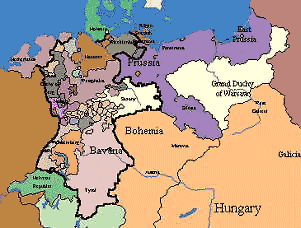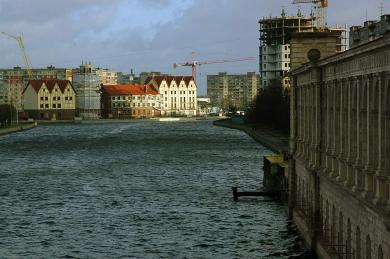Prussia was a loosely affiliated German province stemming from control of the area by the Teutonic Order from the 13th century on. The original inhabitants were Baltic Prusi ... After WW1, part of the Prussian territory became Lithuanian, some went to Poland, and some staying in German jurisdiction. After WW2, the war-torn lands of Prussia were divided between Russia itself, with portions handed to the Soviet states of Lithuania, Poland, and the Ukraine. After 6 centuries, Prussia per se existed no more.
 Prussia in "ancient" days from the 13th century to 1805 Graphic from www.clausewitz.com/readings/Bassford/Cworks/MapsPrussia.html
Prussia in "ancient" days from the 13th century to 1805 Graphic from www.clausewitz.com/readings/Bassford/Cworks/MapsPrussia.html Diminished Prussia after defeat by Napolean after 1808 Graphic from www.clausewitz.com/readings/Bassford/Cworks/MapsPrussia.html
Diminished Prussia after defeat by Napolean after 1808 Graphic from www.clausewitz.com/readings/Bassford/Cworks/MapsPrussia.html The remains of Prussia after World War 1. Graphic from www.saveyourheritage.com/history_of_poland.htm
The remains of Prussia after World War 1. Graphic from www.saveyourheritage.com/history_of_poland.htm The disappearance of Prussia, and the new exclave of Russia after WWII. And after 1991 surrounded by pro-Western nations. Graphic from www.saveyourheritage.com/history_of_poland.htm
The disappearance of Prussia, and the new exclave of Russia after WWII. And after 1991 surrounded by pro-Western nations. Graphic from www.saveyourheritage.com/history_of_poland.htmIt was interesting to talk with someone whose homeland had officially disappeared, though the villages and land remains ... Another dinner partner was a Russian woman who had lived in Kazakhstan before the breakup of the Soviet Union, but she and her husband found themselves without a welcoming home after Kazakhstan became independent. They were not welcome either in Russia (where they had never lived even though ethnically that was their ancestral home).
These individuals both however had found a new home and citizenship in the US. For Teatree, a rather startling closeup encounter with the concept of fragile belonging or exile.
The Kaliningrad Oblast
Beyond these individual stories, today there remains an isolated territory of Russia around the town of Kalingrad, once known as Konigsberg in East Prussia. When the Soviet empire dissolved in 1991, this territory (which had been established after WW2 to provide Russia with a relatively ice free port on the Baltic Sea running through its "allies") now found itself surrounded by newly independent Baltic nations and Poland - all enthusiastically orienting themselves to Western Europe, as well as East Germany being re-united with its Western counterpart.
Sad? It depends ...
From http://geography.about.com, we read, "Russia's smallest oblast (region) of Kaliningrad is an exclave located 200 miles away from the border of Russia proper. Kaliningrad was a spoil of World War II, allocated from Germany to the Soviet Union at the Potsdam Conference that divided Europe between the allied powers in 1945. The oblast is a wedge-shaped piece of land along the Baltic Sea between Poland and Lithuania, approximately one-half the size of Belgium, ... The oblast's primary and port city is also known as Kaliningrad."
At one time during the cold war decades, this Russian enclave was home to nearly 500,000 soviet forces - today there are around 25,000. Here are a few more factoids of this region's history ... "The philosopher Immanuel Kant was born in Konigsberg in 1724. The capital of German East Prussia, Konigsberg was the home to a grand Prussian Royal Castle, destroyed along with much of the city in World War II. Konigsberg was renamed Kaliningrad in 1946 after Mikhail Kalinin, formal "leader" of the Soviet Union from 1919 until 1946. At the time, Germans living in the oblast were forced out, to be replaced with Soviet citizens."
From wikipedia, we read, "In 1996, Kaliningrad was designated a Special Economic Zone. Manufacturers based there get tax and customs duty breaks on the goods they send back to Russia. Although corruption was an early deterrent, that policy means the region is now a manufacturing hub. One in three televisions in Russia is made in Kaliningrad ... and it is home to Cadillac, Hummer and BMW related car plants... Moscow has declared it will turn the region into "the Russian Hong Kong."
The European Commission provides funds for business projects under its special programme for Kaliningrad. The region has begun to see increasing trade with the countries of the EU as well as increasing economic growth and rising industrial output. With an average GDP growth of more than 10% per year for three years to 2007, Kaliningrad is growing faster than any other region in Russia, even outstripping the success of its EU neighbours.
So a few pictures of Kaliningrad - the region and its capital city.
Click on image for full picture
 Kaliningrad Oblast, Russia - population just under 1 million, 94% of which are "newcomers" - Russians, Ukrainians, and Belarussians, with virtually no Lithuanians, Germans or Poles.
Kaliningrad Oblast, Russia - population just under 1 million, 94% of which are "newcomers" - Russians, Ukrainians, and Belarussians, with virtually no Lithuanians, Germans or Poles. The capital city, Kaliningrad Photo from www.absolutrusia.com
The capital city, Kaliningrad Photo from www.absolutrusia.com A Russian Orthodox church in the Oblast, photo taken from http://abunchofbenches.blogspot.com/2012_03_01_archive.html
A Russian Orthodox church in the Oblast, photo taken from http://abunchofbenches.blogspot.com/2012_03_01_archive.htmlClick on image for full picture
 This picture made the news a week or so ago, when a giant Russian military hovercraft landed near a crowded beach - everyone seemed to take it in stride. Photo from http://rt.com/news/ship-docks-beach-kalinigrad-779/ One can see the craft land on youtube ...
This picture made the news a week or so ago, when a giant Russian military hovercraft landed near a crowded beach - everyone seemed to take it in stride. Photo from http://rt.com/news/ship-docks-beach-kalinigrad-779/ One can see the craft land on youtube ...

2 comments:
Thanks for the geopolitical enlightenment. It's hard to imagine what it must feel like to have a homeland that most people have never heard of. Knowing "where you're from" and sharing that with others is an important part of identity and feeling grounded. It is a nice reminder that America is a land of immigrants, a place where many have found and created a new home.
I had no idea Kaliningrad even existed. Fascinating. Also brings to mind all of the third culture kids who have a similar reaction when asked where they're from.
Post a Comment